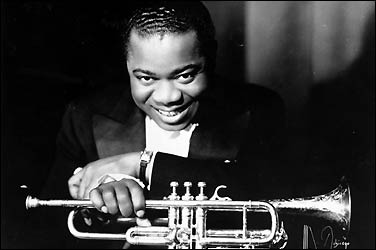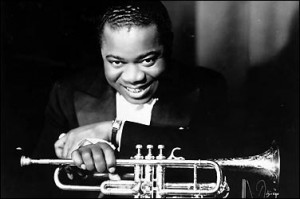In 1928, Louis Armstrong took his band into a recording studio and emerged with what Ken Burns would later describe as the most sublime 4 minutes in the history of music:
West End Blues was the start of an astonishing 18 month run in recording studios in New York which would produce what Kingsley Amis later called “the hottest record ever made”.. St Louis Blues (unplayable on a loud needle on a gramophone, take it from me – not if you want to keep your windows)
..and the first truly great cover version, of the frighteningly young Fats Waller’s “Ain’t Misbehavin'”…
The same blue streak saw Armstrong issue the classic versions of “St James Infirmary”, “Black and Blue”, “After You’ve Gone”, “Sweet Savannah Sue” and a host of others. Had 33rpm been available in 1929, surely this sequence would have formed the first true concept album, the first absolutely coherent series of recordings by an artist?
Armstrong in New York in the months around the Great Crash was doing what the Beatles and Rolling Stones would later in “Revolver” and “Exile on Main Street”: but those bands wouldn’t be seen for another three decades, nor any British popular musicians of equivalent originality. But didn’t Britain have recording studios, popular musical traditions, composers of its own? Indeed it did: so why did it take that extra thirty years to catch?
For one thing, because Britain and the United States had such a different experience of World War One. It’s hard to exaggerate the cultural stuffing that the Great War knocked out of Britain. A visible quietism dominated the scene for many years after, with no great enthusiasm for anything knew that didn’t pay some obeisance to the values of pre-1914. Victory might have confirmed our values, but it also froze them, and gave them a chilly overlay of scepticism. By contrast, victory in the Great War seemed to confirm the astonishing trajectory that the United States had embarked upon at the turn of the century. The black army musicians we meet in France at the start of 1943’s “Stormy Weather” go home full of hope for the future and full of faith in their music. Men like Alfred Williams and Percy Grainger had already begun collecting the folk music of Britain before World War One, considering it a dying thing, losing its future. The black American ragtimers went home and took their tradition somewhere else entirely.
How they did so, in the light of the opposition they faced from white society, has left us twin legacies: music of incomparable gorgeousness, and a story of human courage and indomitableness for the ages. There are such stories in interwar British music, too, but they belong to classical musicians, to people like the autodictat Edward Elgar or Ethyl Smyth. Elsewhere, the evolving tradition wasn’t so much folk or jazz as music hall, which as the period went on drifted into cinema without really changing its essential nature, producing genuine stars, but little really new: nothing, at any rate, that compared with Armstrong or Elgar.
What Britain needed, it wouldn’t get until much later – cheap instruments (to match Robert Johnson’s mail order guitar of the American late 1920s) and amplification, so four guys could afford to put together a band that could fill a room with sound. There were British jazz bands aplenty before the war – but for them, the money was in standards, not the occasional hot numbers hotel managers and radio producers would permit them to attempt. Something about rock music set off the British imagination in a way that jazz had not – something about it inspired the British to try new things with it, not just copy, emulate and admire. Armstrong would very much be around to see it, of course: in 1964, his “Hello, Dolly!” would push the Beatles off the US #1 spot. Shortly afterwards, the British bands would take up from Armstrong’s 1929, and produce the first popular music of world-enthralling originality ever to carry the Union Jack.


One story is that the New Orleans street bands had access to lots of cheap Army surplus instruments after the Civil War and the Spanish-American War. I’m not convinced it explains much.
P.S. Here’s Fats with St Louis Blues.
http://www.youtube.com/watch?v=N_XfbVMjMYw&feature=related
P.P.S. Do you think that this Listening Guide version adds much to West End Blues?
http://www.youtube.com/watch?v=QbD8loUP9CY